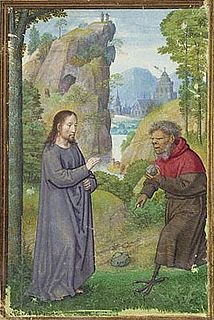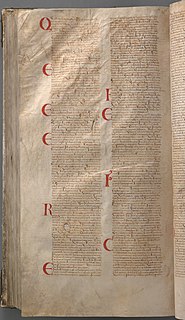Related Research Articles

Matthew 4:3 is the third verse of the fourth chapter of the Gospel of Matthew in the New Testament. This verse opens the section in Matthew dealing with the temptation of Christ by Satan. Jesus has been fasting for forty days and forty nights and in this verse the devil gives Christ his first temptation and encourages him to use his powers to get food.

Matthew 4:24 is the twenty-fourth verse of the fourth chapter of the Gospel of Matthew in the New Testament. This verse is part of a brief summary of and introduction to Jesus' ministry in Galilee, which will be recounted in the next several chapters. This verse relates Jesus' fame "throughout all Syria" and summarizes his work of healing.

Mark 5 is the fifth chapter of the Gospel of Mark in the New Testament of the Christian Bible. Taken with the calming of the sea in Matthew 4:35–41, there are "four striking works [which] follow each other without a break": an exorcism, a healing, and the raising of Jairus' daughter.

Mark 7 is the seventh chapter of the Gospel of Mark in the New Testament of the Christian Bible. This chapter explores Jesus' relationships with both fellow Jews and Gentiles. Jesus speaks with the Pharisees and scribes, and then with his disciples, about defilement, and then heals two gentiles. Scholars debate just how much of this reflects Jesus' own view and how much is reflective of the conflict between Jewish and Gentile converts in the early Church.

Mark 9 is the ninth chapter of the Gospel of Mark in the New Testament of the Christian Bible. It begins with Jesus' prediction that "I tell you the truth, some who are standing here will not taste death before they see that the kingdom of God has come with power". The chapter then recounts the transfiguration of Jesus, a healing miracle, and Jesus' teaching about the return of Elijah, humility and temptation.

Matthew 12 is the twelfth chapter in the Gospel of Matthew in the New Testament section of the Christian Bible. It continues the narrative about Jesus' ministry in Galilee and introduces controversy over the observance of the Sabbath for the first time.

Chapter 18 of the Gospel of Matthew contains the fourth of the five Discourses of Matthew, also called the Discourse on the Church. It includes the parables of the Lost Sheep and the Unforgiving Servant which also refer to the Kingdom of Heaven. The general theme of the discourse is the anticipation of a future community of followers, and the role of his apostles in leading it.

Luke 8 is the eighth chapter of the Gospel of Luke in the New Testament of the Christian Bible. The book containing this chapter is anonymous but early Christian tradition uniformly affirmed that Luke composed this Gospel as well as the Acts of the Apostles. This chapter mentions the woman who supported Jesus and records some of the great miracles he performed, as well as several parables told by him.

Luke 14 is the fourteenth chapter of the Gospel of Luke in the New Testament of the Christian Bible. It records one miracle performed by Jesus Christ on a Sabbath day, followed by His teachings and parables. The book containing this chapter is anonymous, but early Christian tradition uniformly affirmed that Luke composed this Gospel as well as the Acts of the Apostles.
Matthew 9:3 is a verse in the ninth chapter of the Gospel of Matthew in the New Testament.
Matthew 9:18 is a verse in the ninth chapter of the Gospel of Matthew in the New Testament.

Matthew 8:16 is a verse verse in the eighth chapter of the Gospel of Matthew in the New Testament which relates Jesus exorcising at sunset.
Matthew 9:33 is a verse in the ninth chapter of the Gospel of Matthew in the New Testament.
Matthew 9:34 is a verse in the ninth chapter of the Gospel of Matthew in the New Testament.
Matthew 9:35 is a verse in the ninth chapter of the Gospel of Matthew in the New Testament.
Matthew 9:36 is a verse in the ninth chapter of the Gospel of Matthew in the New Testament.
Matthew 8:20 is the 20th verse in the eighth chapter of the Gospel of Matthew in the New Testament of the Christian Bible. It reveals the Homelessness of Jesus and his followers.

Matthew 8:28 is the 28th verse in the eighth chapter of the Gospel of Matthew in the New Testament.

Matthew 8:29 is the 29th verse in the eighth chapter of the Gospel of Matthew in the New Testament.

Matthew 8:31 is 31st verse in the eighth chapter of the Gospel of Matthew in the New Testament.
References
- ↑ John MacEvilly, An Exposition of the Gospel of St. John consisting of an analysis of each chapter and of a Commentary critical, exegetical, doctrinal and moral, Dublin Gill & Son 1879.
- 1 2 "Catena aurea: commentary on the four Gospels, collected out of the works of the Fathers: Volume 6, St. John. Oxford: Parker, 1874. Thomas Aquinas".
 This article incorporates text from this source, which is in the public domain.
This article incorporates text from this source, which is in the public domain.